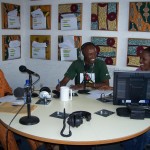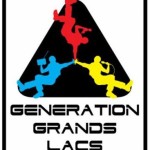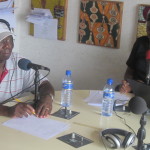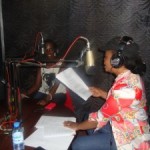A Rwandan Journalist Travels for Search for Common Ground to Kinshasa

Generation Grand Lacs is a joint radio project between Burundi, Rwanda and Democratic Republic of Congo.
SFCG has recently revived its radio program Generation Great Lakes, and is working with a new group of young journalists from Burundi, Rwanda, and the Democratic Republic of Congo (DRC) to produce the series. One of the aims of Generation Great Lakes is to bring greater understanding of each others cultures and lives to youth across the region. To follow the project in greater detail, you can like their Facebook page. SFCG coordinates the project, which is a collaboration between five radio stations: RTG@ in Kinshasa, Mishapi Voice TV in Goma, Radio Isango Star in Kigali, Radio Salus in Butare (Rwanda), and Radio Isanganiro in Bujumbura. At each station, two journalists are assigned to the program. Professional and personal exchange are important, therefore, the 10 journalists of the team rotate around the different stations (on a schedule) for joint production.
A recent rotation took place when Rwandan journalist, Sandrine Isheja Butera, traveled to Kinshasa to co-host the program. It was her first time in DRC, first time on a plane, and she was made doubly nervous with all of the warnings and concerns about DRC that her friends and family gave.
Sandrine writes about her first experience in Kinshasha for the Common Ground Blog:
By: Sandrine Isheja Butera
I am surprised to find how nice people are, contrary to what I was told before leaving Rwanda. In fact, all my friends and family were afraid when I told them I had to go to the Democratic Republic of Congo. I must admit, I myself was apprehensive about going to Kinshasa to co-host this program. War and the tense situation between our two countries do not make our relations easy.
My travel itinerary was to fly to Nairobi and then catch another plane to the capital of the Republic of Congo, Brazzaville where I had to spend the night and take a boat the next day to go to the capital of the Democratic Republic of Congo, Kinshasa. The journey promised to be long but I was determined to see the bright side of it and not let fear take over.
At the airport in Nairobi, I met many of my friends who play on the Rwanda national Beach Volley Ball team. We spent two hours together talking and playing cards and they left just an hour before me.
I finally flew to Brazzaville, where I arrived around midnight. At the airport of Brazzaville, I was met by a contact who took me to my hotel.
The next morning, the contact came to accompany me to the Beach Ngobila where I had to take the speedboat to Kinshasa. He had brought along another person who would help me with the customs formalities.
I was surprised by the hostility the people of Brazzaville displayed towards me. As soon as the police officer guarding the entrance to the port saw in my passport that I was Rwandan, he started saying that we are wicked Rwandans, calling us barbarians. He went on to tell my contact to drop me in case I was his wife because I was going to lie to him and have children with other Rwandans.
I could not believe he would say such things in my presence, and I was sure that the border crossing would not be a cup of tea. After these insulting remarks, the next blow came at the entrance to the port. The immigration officials refused to give me a transit visa even though I’d been told the previous evening at the airport that I would not need it. But the immigration officer had a different opinion and tried to force me to return to the airport to obtain the stamp for transit. However, the person who was helping me to complete the formalities convinced the immigration officials to sell it to me for $50.
I thought the hardest part was over, but as soon as I walked towards the boarding area, I encountered more obstacles as other officials approached me to demand another inexplicable fee. The person, who continued to help me, pushed me through the officials and stayed behind to negotiate with them.
I arrived in Kinshasa between 11 am and noon. There, people were more friendly and smiling. Their voices were not threatening as they had been in Brazzaville. I felt really relieved when I saw my colleague from the RTG@, Francis Kadima, waiting for me. Kadima is part of the team who produces Generation Great Lakes.
However, again I was a little shocked by the small fees that had to be paid to certain individuals. There were those who asked for money to for a stamp that would confirm I had my vaccination card. We asked them why we should pay it and when they were unable to find an answer, they let us go
We immediately headed to the radio studio where we had to present the program at 1pm. At the radio studio I was warmly welcomed and I was glad to see that Kinshasa was not like I had been told. It was quite the opposite.
However, the heat is stifling in this city. Another major obstacle are the street children called sheger (I say street children but they are almost of all ages). Even the locals are afraid of them at night. This prevents me from walking around freely and to go to the radio to prepare for the show. I always have to wait for someone to take me to the hotel and these waits can be long as they are all busy with other things too.
My stay in Kinshasa continues, but in the three days I have spent here my awareness has changed. I have realized how widespread the prejudices in the minds of people still are and how important programs like the Generations Great Lakes are.
Sandrine Isheja Butera
Radio journalist in Kigali Star Isango









